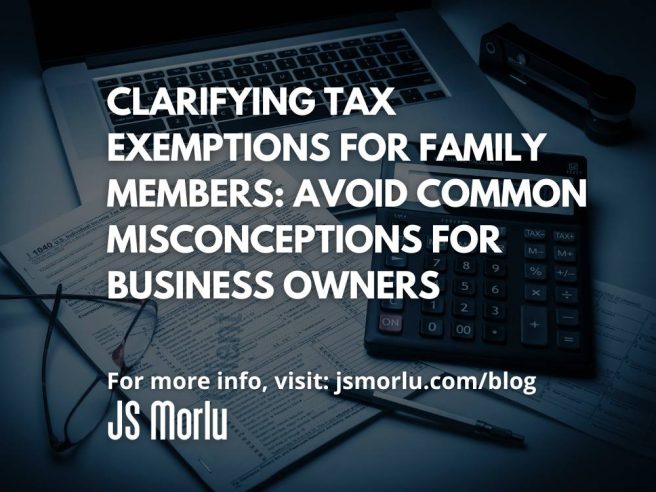By: John S. Morlu II, CPA
Tax exemptions and withholding rules can often lead to confusion, especially among business owners employing family members or students. One common misconception is the belief that certain groups of employees—like family members or students—are automatically exempt from federal income tax withholding. While exemptions are possible under specific conditions, they are not guaranteed. Misunderstanding these rules can result in compliance issues and penalties. This article clarifies the criteria for exemptions and explores the implications of tax withholding regulations.
Understanding Federal Income Tax Withholding
Federal income tax withholding is a system that ensures employees pay their income taxes throughout the year. Employers are responsible for withholding a portion of an employee’s wages and remitting it to the IRS. However, in specific situations, employees may qualify for an exemption from federal income tax withholding. It’s critical for employers and employees alike to understand the conditions under which these exemptions apply to avoid missteps.
Criteria for Tax Exemptions
To qualify for an exemption from federal income tax withholding, an employee must satisfy both of the following conditions:
1. No Tax Liability in the Prior Year
The employee must have had no federal income tax liability in the previous tax year. This means that after filing their tax return, they owed no federal income tax and were eligible for a full refund of any taxes withheld during the year.
2. No Tax Liability Expected in the Current Year
The employee must anticipate having no federal income tax liability for the current year. This expectation generally arises when their total income falls below the standard deduction amount, meaning they will owe no federal income tax.
If these criteria are met, the employee can claim an exemption by completing IRS Form W-4, Employee’s Withholding Certificate, and submitting it to their employer. However, it is essential to reevaluate eligibility annually, as changes in income or tax law may affect exemption status.
The Role of IRS Publication 505
IRS Publication 505, titled Tax Withholding and Estimated Tax, serves as a comprehensive resource for employees and employers to calculate proper withholding amounts. It includes worksheets to help employees determine whether they qualify for an exemption from federal income tax withholding. Employers can also refer to the publication to ensure compliance with IRS guidelines.
Exemptions Do Not Apply to FICA Taxes
It’s important to note that exemptions from federal income tax withholding do not extend to Federal Insurance Contributions Act (FICA) taxes. FICA taxes include Social Security and Medicare taxes, which are mandatory for most employees and employers. Even if an employee qualifies for a federal income tax withholding exemption, their wages remain subject to FICA taxes unless specific exceptions apply, such as for certain types of family employment discussed below.
Misconceptions About Automatic Exemptions
One of the most pervasive myths among business owners is that family members or students automatically qualify for exemptions from federal income tax withholding. This is not true. Exemptions are determined based on income level and tax liability, not familial relationships or student status. Let’s explore these scenarios in more detail:
Family Members
While employing family members can have tax advantages, automatic exemptions from income tax withholding do not exist simply because of the employee’s relationship to the employer. For instance:
- A child employed by their parents in a sole proprietorship or a partnership where both partners are parents may be exempt from FICA taxes if they are under 18. However, this exemption does not apply to federal income tax withholding unless the aforementioned criteria are met.
- Similarly, wages paid to a spouse are subject to federal income tax withholding, although they may be exempt from Federal Unemployment Tax Act (FUTA) taxes under certain conditions.
Students
Many employers incorrectly assume that students are exempt from federal income tax withholding due to their academic status. While students may qualify for an exemption if their income is below the standard deduction, their student status alone does not guarantee exemption. Employers should assess each student’s situation individually and rely on IRS guidelines to determine withholding obligations.
Practical Implications for Employers
Understanding the nuances of tax withholding and exemptions is vital for employers to remain compliant with IRS regulations. Here are some practical steps to take:
1. Educate Employees About Withholding Rules
- Provide employees with resources like IRS Publication 505 to help them understand their withholding options and responsibilities.
- Encourage employees to use the IRS Tax Withholding Estimator tool to ensure accurate withholding amounts.
2. Review Form W-4 Submissions
- Carefully review employees’ Form W-4 submissions to ensure they meet the criteria for exemptions. If an employee claims an exemption, verify that they understand the conditions and are eligible.
3. Maintain Accurate Records
- Keep detailed records of all withholding certificates and related correspondence. This documentation can be critical in case of an IRS audit or inquiry.
4. Monitor Changes in Tax Laws
- Stay updated on changes to tax laws and standard deduction amounts, as these may impact employees’ eligibility for exemptions.
Addressing Common Misunderstandings
To further clarify tax withholding rules, let’s address some common misconceptions:
Misconception 1: Family Members Are Always Exempt
As mentioned earlier, family members—such as children or spouses—are not automatically exempt from federal income tax withholding. Exemptions depend on income level and tax liability, not familial relationships.
Misconception 2: Students Automatically Qualify for Exemptions
Student status alone does not exempt an individual from income tax withholding. Employers should evaluate the student’s income and use Form W-4 to determine withholding requirements.
Misconception 3: Exemptions Are Permanent
Exemptions must be reassessed annually. Employees who claimed an exemption in the prior year must verify that they still meet the criteria for the current year before submitting a new Form W-4.
Tax Implications for Employers
Employers who fail to properly withhold taxes or grant exemptions without verifying eligibility may face penalties and interest charges from the IRS. In addition, incorrectly classified exemptions can lead to complications during payroll audits. Employers must exercise diligence and consult with tax professionals if necessary.
Benefits of Proper Compliance
While the rules around tax exemptions may seem complex, adhering to them can benefit both employers and employees:
1. Reduced Risk of Penalties
Proper withholding ensures compliance with IRS regulations, minimizing the risk of penalties for underpayment or misclassification.
2. Employee Satisfaction
Educating employees about their withholding options demonstrates a commitment to their financial well-being, which can boost morale and retention.
3. Streamlined Payroll Processing
Accurate withholding simplifies payroll processing and reduces administrative burdens associated with correcting errors.
Resources for Employers and Employees
To help navigate the complexities of tax withholding, the following resources are invaluable:
1. IRS Publication 505
- Provides detailed guidance on tax withholding and estimated taxes.
- Includes worksheets to calculate withholding amounts and assess exemption eligibility.
2. IRS Tax Withholding Estimator
- An online tool that helps employees determine their correct withholding amount based on income, deductions, and credits.
3. Payroll Software and Services
- Many payroll software platforms include features to calculate withholding amounts automatically and ensure compliance with IRS guidelines.
4. Professional Tax Advisors
- Tax professionals can provide personalized advice and ensure that both employers and employees meet their tax obligations.
Conclusion
Misconceptions about tax exemptions can lead to costly mistakes for business owners. By understanding the criteria for exemptions, utilizing IRS resources, and staying informed about tax regulations, employers can ensure compliance and avoid common pitfalls. Clear communication with employees about their withholding options is essential for fostering a culture of transparency and financial responsibility. Armed with accurate information, business owners can navigate the complexities of tax withholding with confidence and focus on growing their businesses.
Author: John S. Morlu II, CPA
John S. Morlu II, CPA, is the CEO and Chief Strategist of JS Morlu, a globally acclaimed public accounting and management consulting powerhouse. With his visionary leadership, JS Morlu has redefined industries, pioneering cutting-edge technologies across B2B, B2C, P2P, and B2G landscapes.
The firm’s groundbreaking innovations include:
• ReckSoft (www.ReckSoft.com): AI-driven reconciliation software revolutionizing financial accuracy and efficiency.
• FinovatePro (www.FinovatePro.com): Advanced cloud accounting solutions empowering businesses to thrive in the digital age.
• Fixaars (www.fixaars.com): A global handyman platform reshaping service delivery and setting new benchmarks in convenience and reliability.
Under his strategic vision, JS Morlu continues to set the gold standard for technological excellence, efficiency, and transformative solutions.
JS Morlu LLC is a top-tier accounting firm based in Woodbridge, Virginia, with a team of highly experienced and qualified CPAs and business advisors. We are dedicated to providing comprehensive accounting, tax, and business advisory services to clients throughout the Washington, D.C. Metro Area and the surrounding regions. With over a decade of experience, we have cultivated a deep understanding of our clients’ needs and aspirations. We recognize that our clients seek more than just value-added accounting services; they seek a trusted partner who can guide them towards achieving their business goals and personal financial well-being.
Talk to us || What our clients says about us





